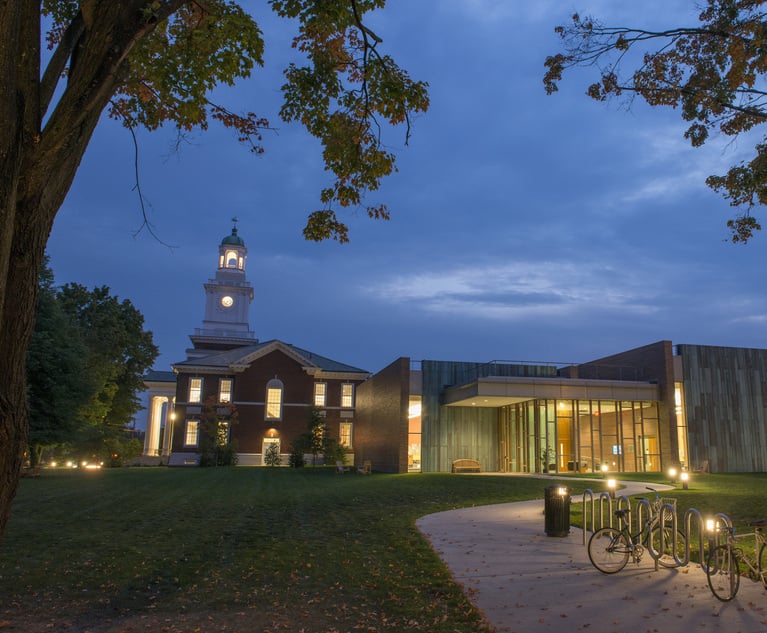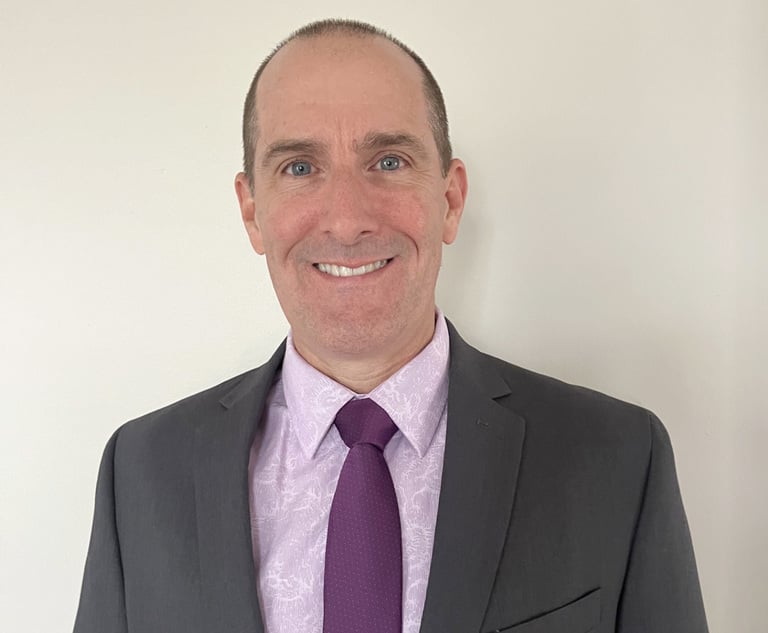Dayton School of Law Offers 3+2 JD
Plenty of law schools have rolled out programs designed to shave a year off the traditional path to a J.D. But on Friday, the University of Dayton…
November 20, 2017 at 03:12 PM
4 minute read
Plenty of law schools have rolled out programs designed to shave a year off the traditional path to a J.D. But on Friday, the University of Dayton School of Law became just the second school to offer a way to slice two years off the typical seven year undergrad-J.D. combo. Dayton, like other schools offering shorter tracks, is eager to attract stronger candidates as the overall applicant pool remains shallow. While many schools have 3+3 programs or accelerated two-year J.D. programs, so far only Dayton and Vermont Law School offer a way to become a lawyer in five years total.
“This is definitely for the best students,” said Paul Schlottman, Dayton's director of strategic initiatives, who helped launch the 3+2 program. “These are for people who are very academically and otherwise gifted.”
The way it works is that students complete three years of courses in a partner undergraduate institution, and then transfer to Dayton, where their first year of law school counts towards their fourth year of undergraduate studies. In law school, students take courses—the same ones as traditional law students—in the summer, fall and spring semesters, which allows them to graduate in two years instead of three. However, if a law student at some point decides life is too hectic, she can always slow down and do the normal three-year J.D. program.
Students in the 3+2 program stand to save tens of thousands of dollars.
Since their first year of law school counts double towards both of degrees, they don't pay tuition or living expenses for their last year of undergraduate college. They pay the same law school tuition as traditional students—nearly $100,200 at Dayton—but they graduate early and save on a year of living expenses—estimated at $17,500, according to Dayton's 2016 disclosure report to the American Bar Association Section of Legal Education and Admissions to the Bar.
“You also have the ability to start earning income and start your career sooner,” said Schlottman.
The 3+2 program is not for everyone. The undergraduate institutions are highly selective, Schlotttman said, using rigorous criteria agreed upon by Dayton. When a student applies for the 3+2 program during undergrad, Dayton only grants provisional acceptance to the law school. To lock it in, the student must take the LSAT in her third year and score at least one point higher than the Dayton median score.
“The goal is to raise those LSAT scores by using this program. We are attracting the high flying students,” Schlottman said.
If a student doesn't make the LSAT cut, he can simply stay put and complete his undergraduate degree, maybe trying again for law school in later years.
So far, Dayton has entered agreements with four undergraduate institutions to participate in the program: the University of Dayton department of communication; the University of St. Francis in Ft. Wayne in Indiana; Walsh University in North Canton, Ohio; and Mount St. Joseph University in Cincinnati.
Schlottman said he expects to see “dozens” of students coming from those schools, and more in the future, as Dayton forges agreements with more undergraduate institutions.
While Vermont Law School was the first to offer a 3+2 program, it's less expansive than Dayton's effort. Vermont has partnered only with the University of Vermont to admit students to its program. Eligibility is limited to students from majors within the university's colleges of agriculture and life sciences, arts and sciences and environment and natural resources.
The idea of the accelerated J.D. program began popping up between 2011 to 2013 as law schools experienced stiff competition to recruit students, and aspiring lawyers scrutinized the high cost of a law degree. Law schools saw accelerated programs as a recruiting tool to snag high-achieving students who already, even as teenagers, wanted to become lawyers.
At least 44 other law schools spread all over the United States already offer 3+3 programs, and at least 20 schools provide an accelerated two-year J.D. program, according to a list on Wikipedia.
Freelance reporter Angela Morris is on Twitter: @AMorrisReports.
This content has been archived. It is available through our partners, LexisNexis® and Bloomberg Law.
To view this content, please continue to their sites.
Not a Lexis Subscriber?
Subscribe Now
Not a Bloomberg Law Subscriber?
Subscribe Now
NOT FOR REPRINT
© 2024 ALM Global, LLC, All Rights Reserved. Request academic re-use from www.copyright.com. All other uses, submit a request to [email protected]. For more information visit Asset & Logo Licensing.
You Might Like
View All

Inside Travers Smith's AI Training, Development Efforts

Wickard AI Partners With Law School to Bring Legal AI Training to Ethiopia
Trending Stories
Who Got The Work
Michael G. Bongiorno, Andrew Scott Dulberg and Elizabeth E. Driscoll from Wilmer Cutler Pickering Hale and Dorr have stepped in to represent Symbotic Inc., an A.I.-enabled technology platform that focuses on increasing supply chain efficiency, and other defendants in a pending shareholder derivative lawsuit. The case, filed Oct. 2 in Massachusetts District Court by the Brown Law Firm on behalf of Stephen Austen, accuses certain officers and directors of misleading investors in regard to Symbotic's potential for margin growth by failing to disclose that the company was not equipped to timely deploy its systems or manage expenses through project delays. The case, assigned to U.S. District Judge Nathaniel M. Gorton, is 1:24-cv-12522, Austen v. Cohen et al.
Who Got The Work
Edmund Polubinski and Marie Killmond of Davis Polk & Wardwell have entered appearances for data platform software development company MongoDB and other defendants in a pending shareholder derivative lawsuit. The action, filed Oct. 7 in New York Southern District Court by the Brown Law Firm, accuses the company's directors and/or officers of falsely expressing confidence in the company’s restructuring of its sales incentive plan and downplaying the severity of decreases in its upfront commitments. The case is 1:24-cv-07594, Roy v. Ittycheria et al.
Who Got The Work
Amy O. Bruchs and Kurt F. Ellison of Michael Best & Friedrich have entered appearances for Epic Systems Corp. in a pending employment discrimination lawsuit. The suit was filed Sept. 7 in Wisconsin Western District Court by Levine Eisberner LLC and Siri & Glimstad on behalf of a project manager who claims that he was wrongfully terminated after applying for a religious exemption to the defendant's COVID-19 vaccine mandate. The case, assigned to U.S. Magistrate Judge Anita Marie Boor, is 3:24-cv-00630, Secker, Nathan v. Epic Systems Corporation.
Who Got The Work
David X. Sullivan, Thomas J. Finn and Gregory A. Hall from McCarter & English have entered appearances for Sunrun Installation Services in a pending civil rights lawsuit. The complaint was filed Sept. 4 in Connecticut District Court by attorney Robert M. Berke on behalf of former employee George Edward Steins, who was arrested and charged with employing an unregistered home improvement salesperson. The complaint alleges that had Sunrun informed the Connecticut Department of Consumer Protection that the plaintiff's employment had ended in 2017 and that he no longer held Sunrun's home improvement contractor license, he would not have been hit with charges, which were dismissed in May 2024. The case, assigned to U.S. District Judge Jeffrey A. Meyer, is 3:24-cv-01423, Steins v. Sunrun, Inc. et al.
Who Got The Work
Greenberg Traurig shareholder Joshua L. Raskin has entered an appearance for boohoo.com UK Ltd. in a pending patent infringement lawsuit. The suit, filed Sept. 3 in Texas Eastern District Court by Rozier Hardt McDonough on behalf of Alto Dynamics, asserts five patents related to an online shopping platform. The case, assigned to U.S. District Judge Rodney Gilstrap, is 2:24-cv-00719, Alto Dynamics, LLC v. boohoo.com UK Limited.
Featured Firms
Law Offices of Gary Martin Hays & Associates, P.C.
(470) 294-1674
Law Offices of Mark E. Salomone
(857) 444-6468
Smith & Hassler
(713) 739-1250










